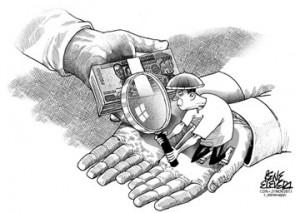Accounted for

In both cases, the question of transparency and accountability of the giver, the user and the recipient or end consumer is raised to public attention, or in the case of the relief aid, to the glaring spotlight of the international community.
Voting 14-0-1, the Supreme Court ruled that there were no guidelines in the use of the PDAF and pork barrel funds or if there were, that they were loosely interpreted and subject to abuse by the lawmakers, who are designated by the Constitution as keepers of the public coffers.
The SC ruling applies to both past and present administrations and by extension, to future governments who may, in unison with their allies in Congress, find ways to circumvent the ruling to reinstate the pork barrel under a different label.
The ruling doesn’t specifically cover the controversial Disbursement Acceleration Program (DAP) which allows the President to hasten the downloading of huge sums supposedly to fast-track major infrastructure programs. The magistrates are still determining whether the use of the DAP is constitutional.
While the SC ruling comes at a time when the allocation of national, local and foreign assistance are under fire from some sectors, this victory by opponents of the pork barrel fund may be short-lived if you consider the notorious flip-flopping of the High Court in the cityhood case of 16 local government units (LGUs) around the country.
Article continues after this advertisementBut it does serve as a warning to legislators and the executive department including the President that indiscriminate use of public funds won’t be tolerated or go unnoticed.
Article continues after this advertisementThe same goes for local and international assistance following reports that some Customs officials have delayed the delivery of relief goods through their bureaucratic processes leading the public to suspect that chicanery is being perpetrated in the midst of the overflowing generosity of the country’s neighbors.
Whether there is any truth to reports that Philippine politicians are banned from distributing the aid remains to be seen but it is a slap to the faces of national government officials who want to be seen and heard giving aid to their constituents to further their own agenda.
In response to public outcry over the slow distribution of typhoon aid, Cebu’s three English daily community papers in cooperation with the private sector led by the Ramon Aboitiz Foundation Inc. mounted a relief tracker database to share information about aid sent to and received by barangays. This also gives due credit to donors who have provided their valuable resources, time and effort to feed and sustain typhoon-hit families.
Transparency and accountability are essential to assure donors and the general public that precious resources , are not being wasted but are going to the right recipients.